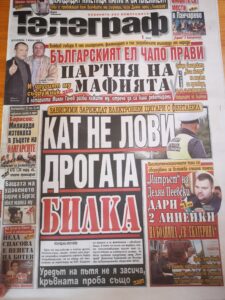The following information and answers were submitted by Yordan Yochev, he has been a journalist for more than 14 years. He is an incoming Central and Eastern European Journalism Program (CEEJ) Fellow. The CEEJ program was postponed and the fellows will be arriving in the U.S. to begin their fellowship in the spring. Until then they will be participating in a webinar series and will be highlighted through a CEEJ blog post series. Q&A Series with CEEJ Fellows Pt 2: Yordan Yochev.
 I was born in a small rural town with about 20,000 citizens. I graduated from a language high school and after that, I have a Bachelor’s degree in journalism from the largest Bulgarian University St. Kliment Ohridski. I have a master’s degree in Public Relations and currently, I am conducting research on media freedom in Bulgaria, which is part of my Ph.D. thesis. I have worked as a newspaper journalist at The Telegraph and the Monitor and have nominations for various publications on topics related to drug use and road safety. Since August I have been working in the Press office of the Bulgarian National Customs Agency.
I was born in a small rural town with about 20,000 citizens. I graduated from a language high school and after that, I have a Bachelor’s degree in journalism from the largest Bulgarian University St. Kliment Ohridski. I have a master’s degree in Public Relations and currently, I am conducting research on media freedom in Bulgaria, which is part of my Ph.D. thesis. I have worked as a newspaper journalist at The Telegraph and the Monitor and have nominations for various publications on topics related to drug use and road safety. Since August I have been working in the Press office of the Bulgarian National Customs Agency.
- What is your topic or content of interest and why?
As a journalist, I am covering the Ministry of Interior and Judicial system. I am interested in reporting problems related to drug trafficking, smuggling, road safety, human rights, education, human trafficking etc. These are fields with great importance for society and the efforts of the government and institutions in Bulgaria in finding solutions are not enough. That is why I am devoted to doing my researches and exposing cases of corruption and abuse of power.
I also cover different motorsport races as a journalist and photographer because I am an ex go-kart racer and a motorcycle enthusiast.
- What brought you to the area of journalism, what made you want to become a journalist, is there someone that inspired you?
I decided to become a journalist during my time at school. I was good at writing and I thought this was a good premise for my future career as a reporter. There are several Bulgarian reporters that I admire today – their names are Samuil Dimitrov who is working for the website www.mediapool.com, Polina Paunova (Free Europe), Svetoslav Ivanov (BTV). In the fields of motorsports, I really enjoy reading articles of Mat Oaxley (Motorsport Magazine) and Paolo Scarleta (www.gpone.com).
- Why does journalism matter?
For me, journalism is not just a profession, it is a mission. Journalism must be a platform for dialogue, it must independently represent different opinions and reflect the views of all groups in a society. In this way, it helps to maintain democracy and inform citizens. Independent journalism is of particular importance because it helps citizens make informed decisions when choosing different and better governance and leadership. Journalists are also the ones that should monitor the government and how public funds are spent and show the cases of abuse of power.
- What is your primary challenge as a journalist in your country?
In my opinion, the challenges for journalists, both in Bulgaria and elsewhere in the world, are the same. One of the main problems is media ownership. People who invest in the media do not do so in order to communicate the truth or to do good journalism, but in order to expand their influence – be it political or economic. This in turn limits the perimeter of topics on which journalists can work freely. Most often, media owners support the governments in Bulgaria, which makes it very difficult to expose cases of corruption or abuse. On the other hand, the media market is very small and there are not many opportunities for a better job for those working in the field. This is one of the reasons why many quality journalists have changed their profession in recent years.
- What is your current understanding of freedom of the press or what does it look like in your country?
My understanding of free journalism is that it is first and foremost about responsibility. Responsibility to seek all points of view on a given problem, to focus on topics that are of particular importance to society. For me, in the free media, editors encourage journalists to do in-depth research on a wide range of topics, rather than stopping them on the grounds that they may affect the interests of someone in the business or government.
- What is the one thing you are most looking forward to during your program in the US?
The opportunity to see a different perspective on the profession, to gain new knowledge, which I will subsequently share with my colleagues and journalist students in Bulgaria. To meet new professionals with whom to exchange experience will be a dream come true.
- What are some of the things that have colored your impression of the U.S.?
Ever since I spent my university years studying journalism, I have been impressed by the fact that the struggle for media independence in the United States began in the 18th century with the First amendment, when non-interference legislation was passed. Government intervention in one way or another in the work of the media is one of the biggest challenges of the 21st century, and the United States has been struggling with it since 1971.
- What are you hoping to accomplish with this fellowship?
The list here is long. Today, journalism is a profession that reflects global issues, often involving countries on different continents. In this regard, it is very important to have a good network of contacts and people with whom you can cooperate in covering global issues and problems. I think this program will be particularly useful in this regard.
I expect to get acquainted with different approaches used by American journalists and apply them in my work back in Bulgaria. It will be interesting for me also to understand how the American media survives economically and defends its independence. Last but not least, I hope to create not only new work relations but also new friendships, to expand my horizons and expertise as a person and a journalist.
















